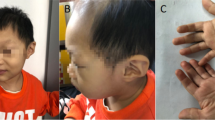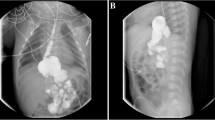Abstract
Congenital nephrotic syndrome (CNS) is a heterogeneous group of diseases with different causes and prognoses. Two thirds of cases of NS in the first year of life are caused by mutations in four genes (NPHS1, NPHS2, WT1, and LAMB2). The mutation of WT1 gene can lead to Denys-Drash syndrome (DDS). We report on female monozygotic twins with CNS presenting at 7 and 8 weeks of age with anuric renal failure. Both twins were treated by peritoneal dialysis. Renal biopsy proved diffuse mesangial sclerosis. Genetic analysis detected a new heterozygote WT1 mutation R434P in both twins. One child developed a unilateral nephroblastoma. Both twins died because of complications of CNS (sepsis and extensive thrombosis of central venous system/sepsis and sudden heart failure) at ages 23 weeks/13.5 months, respectively. DNA analysis showed the same WT1 mutation in the father, who showed at his age of 41 years no clinical consequences of this mutation and no signs of DDS. In conclusion, we report the third family with monozygotic twins with DDS due to WT1 mutation. The DDS has very rapidly led to end-stage renal failure and death in both twins which is in striking contrast to the manifestation in their father.

Similar content being viewed by others

References
Büscher AK, Kranz B, Büscher R, Hildebrandt F, Dworniczak B, Pennekamp P, Kuwertz-Bröking E, Wingen AM, John U, Kemper M, Monnens L, Hoyer PF, Weber S, Konrad M (2010) Immunosuppression and renal outcome in congenital and pediatric steroid-resistant nephrotic syndrome. Clin J Am Soc Nephrol 5(11):2075–2084
Chernin G, Vega-Warner V, Schoeb DS, Heeringa SF, Ovunc B, Saisawat P, Cleper R, Ozaltin F, Hildebrandt F, Members of the GPN Study Group (2010) Genotype/phenotype correlation in nephrotic syndrome caused by WT1 mutations. Clin J Am Soc Nephrol 5(9):1655–1662
Coppes MJ, Liefers GJ, Higuchi M, Zinn AB, Balfe JW, Williams BR (1992) Inherited WT1 mutation in Denys-Drash syndrome. Cancer Res 52(21):6125–6128
Denys P, Malvaux P, Van Den Berghe H, Tanghe W, Proesmans W (1967) Association of an anatomo-pathological syndrome of male pseudohermaphroditism, Wilms’ tumor, parenchymatous nephropathy and XX/XY mosaicism. Arch Fr Pédiatr 24(7):729–739
Dharnidharka VR, Ruteshouser EC, Rosen S, Kozakewich H, Harris HW Jr, Herrin JT, Huff V (2001) Pulmonary dysplasia, Denys-Drash syndrome and Wilms tumor 1 gene mutation in twins. Pediatr Nephrol 16(3):227–231
Drash A, Sherman F, Hartmann WH, Blizzard RM (1970) A syndrome of pseudohermaphroditism, Wilms’ tumor, hypertension, and degenerative renal disease. J Pediatr 76(4):585–593
Furtado L, Pysher T, Opitz J, Lamb R, Comstock J, Batish S, Mauch T, Nelson R, Zhou H (2011) Denys-Drash syndrome with neonatal renal failure in monozygotic twins due to C.1097 G > A mutation in the WT1 gene. Fetal Pediatr Pathol. Mar 24 (in press)
Gellermann J, Stefanidis CJ, Mitsioni A, Querfeld U (2010) Successful treatment of steroid-resistant nephrotic syndrome associated with WT1 mutations. Pediatr Nephrol 25(7):1285–1289
Habib R, Loirat C, Gubler MC, Niaudet P, Bensman A, Levy M, Broyer M (1985) The nephropathy associated with male pseudohermaphroditism and Wilms’ tumor (Drash syndrome): a distinctive glomerular lesion—report of 10 cases. Clin Nephrol 24(6):269–278
Hinkes BG, Mucha B, Vlangos CN, Gbadegesin R, Liu J, Hasselbacher K, Hangan D, Ozaltin F, Zenker M, Hildebrandt F, Arbeitsgemeinschaft für Paediatrische Nephrologie Study Group (2007) Nephrotic syndrome in the first year of life: two thirds of cases are caused by mutations in 4 genes (NPHS1, NPHS2, WT1, and LAMB2). Pediatrics 119(4):e907–e919
Hohenstein P, Hastie ND (2006) The many facets of the Wilms’ tumour gene, WT1. Hum Mol Genet 15(Spec No 2):R196–R201
Jeanpierre C, Denamur E, Henry I, Cabanis MO, Luce S, Cécille A, Elion J, Peuchmaur M, Loirat C, Niaudet P, Gubler MC, Junien C (1998) Identification of constitutional WT1 mutations, in patients with isolated diffuse mesangial sclerosis, and analysis of genotype/phenotype correlations by use of a computerized mutation database. Am J Hum Genet 62(4):824–833
Little SE, Hanks SP, King-Underwood L, Jones C, Rapley EA, Rahman N et al (2004) Frequency and heritability of WT1 mutations in nonsyndromic Wilms’ tumor patients: a UK Children’s Cancer Study Group Study. J Clin Oncol 22(20):4140–4146
Morrison AA, Viney RL, Saleem MA, Ladomery MR (2008) New insights into the function of the Wilms tumor suppressor gene WT1 in podocytes. Am J Physiol Ren Physiol 295(1):F12–F17
Mucha B, Ozaltin F, Hinkes BG, Hasselbacher K, Ruf RG, Schultheiss M, Hangan D, Hangan D, Hoskins BE, Everding AS, Bogdanovic R, Seeman T, Hoppe B, Hildebrandt F, Members of the APN Study Group (2006) Mutations in the Wilms’ tumor 1 gene cause isolated steroid resistant nephrotic syndrome and occur in exons 8 and 9. Pediatr Res 59(2):325–331
Pelletier J, Bruening W, Kashtan CE, Mauer SM, Manivel JC, Striegel JE, Houghton DC, Junien C, Habib R, Fouser L (1991) Germline mutations in the Wilms’ tumor suppressor gene are associated with abnormal urogenital development in Denys-Drash syndrome. Cell 67(2):437–447
Ruf RG, Schultheiss M, Lichtenberger A, Karle SM, Zalewski I, Mucha B, Everding AS, Neuhaus T, Patzer L, Plank C, Haas JP, Ozaltin F, Imm A, Fuchshuber A, Bakkaloglu A, Hildebrandt F, APN Study Group (2004) Prevalence of WT1 mutations in a large cohort of patients with steroid-resistant and steroid-sensitive nephrotic syndrome. Kidney Int 66(2):564–570
Sakai A, Tadokoro K, Yanagisawa H, Nagafuchi S, Hoshikawa N, Suzuki T, Kohsaka T, Hasegawa T, Nakahori Y, Yamada M (1993) A novel mutation of the WT1 gene (a tumor suppressor gene for Wilms’ tumor) in a patient with Denys-Drash syndrome. Hum Mol Genet 2(11):1969–1970
Tsuda M, Sakiyama T, Owada M, Chiba Y (1996) A newly identified exonic mutation of the WT1 gene in a patient with Denys-Drash syndrome. Acta Paediatr Jpn 38(3):265–266
Zirn B, Wittmann S, Gessler M (2005) Novel familial WT1 read-through mutation associated with Wilms tumor and slow progressive nephropathy. Am J Kidney Dis 45(6):1100–1104
Acknowledgments
This work was supported by grant GAUK (Grant Agency of the Charles University) No. 910 10 and grant of the Ministry of Health Czech Republic VZ No. 0006420301. We would like to thank Dr. Beata Lipska, Ph.D. for the help with correct nomenclature of WT1 mutations.
Conflict of interest
The authors declare no conflict of interest.
Author information
Authors and Affiliations
Corresponding author
Rights and permissions
About this article
Cite this article
Fencl, F., Malina, M., Stará, V. et al. Discordant expression of a new WT1 gene mutation in a family with monozygotic twins presenting with congenital nephrotic syndrome. Eur J Pediatr 171, 121–124 (2012). https://doi.org/10.1007/s00431-011-1497-3
Received:
Accepted:
Published:
Issue Date:
DOI: https://doi.org/10.1007/s00431-011-1497-3



